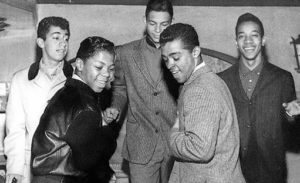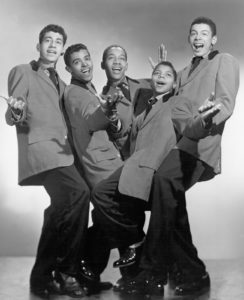The Beginning of Frankie Lymon
Frankie Lymon was apart of the sensational singing group called “The Teenagers”. The Teenagers were five kids from Washington Heights who were discovered by the Valentines’ lead singer Richie Barrett.Their first record, “Why Do Fools Fall in Love?” rose to the top of the charts. At only age 13, Frankie Lymon became the most popular singer across the nation. The Teenagers kept clean-cut image, and were very energetic on stage. This wholesome image generated sales since it did not upset middle lass American parents. Very much so contrary to the rebellious generation of young adults during the time.
In their early career, the group appeared in numerous televised screenings. These included the movie Rock. Rock, Rock, Alan Freed’s radio show,and the film Don’t Knock the Rock. They later began a tour with Bill Haley and released a single called “Baby, Baby”, which would be on their first album entited Meet the Teenagers. Frankie Lymon and the Teenagers at the London Palladium would be their second album.
Lymon was convinced by George Goldner to remove himself from the group and become a solo act. “Goody Goody” was Lymon’s last record with the Teenagers. Frankie and the Teenagers reunited to sing their hit “Goody Goody” in 1958 on Dick Clark’s “American Bandstand”.




Lymon’s Solo Career
Frankie was a sensation through his voice, personality, and image. Lymon had a gap-tooth, baby-face, and angel-like voice. This was matched with an ambition for show business and the portrayal of America’s youth. However, as a result of a voice change, Frankie’s career plummeted. His commercial appeal diminished, and his newly tenor voice did not attract record sales and performances. Also, Lymon struggled with addiction. It would ultimately be the cause of his death. Lymon was very influential before his voice had changed.
Hi voice heavily influenced rock, soul and R&B stars. These included Earth, Wind and Fire, The Temptations and the Jackson Five. All emale singing groups also imitated Lymon’s act, such as Dianna Ross. Due to his impact, Lymon and The Teenagers were inducted into the Hall of Fame.
Singles- Frankie Lymon and The Teenagers
- 1956 “Why Do Fools Fall in Love”
- 1956 “I Want You to Be My Girl”
- 1956 “I Promise to Remember”
- 1956 “The ABC’s of Love”
- 1956“Baby, Baby”
- 1957“Paper Castles”
- 1957“Love Is a Clown ”
- 1957“Miracle in the Rain”
- 1957 “Goody Goody”
Solo-Frankie Lymon
- 1957“My Girl”
- 1957“Little Girl”
- 1958“Thumb Thumb”
- 1958 “Mama Don’t Allow It”
- 1958 “Only Way to Love”
- 1959“No Matter What You’ve Done”
- 1959[Gee 1052] “Goody Good Girl
- 1960“Little Bitty Pretty One”
- 1960“Buzz Buzz Buzz”
- 1961 “Jailhouse Rock”
- 1961“Change Partners”
- 1961 “Young”
- 1964: “To Each His Own”
- 1964: “Somewhere”
- 1969: “I’m Sorry”
Albums
- 1956: Frankie Lymon And The Teenagers
- 1957: Frankie Lymon at the London Palladium
- 1958: Rock & Roll with Frankie Lymon
- 1994: Complete Recordings
MacGregor, Jeff. “Teen Idol Frankie Lymon’s Tragic Rise and Fall”Web. Jan 2018. 12 Dec 2019.
Pruter, Robert. “Frankie Lymon and The Teenagers”Britannica.com. Web. Feb 2000. 12 Dec 2019.
Frankie Lymon
Frankie LymonFrankie Lymon Previous Next The Beginning of Frankie Lymon Frankie Lymon was apart of the sensational singing group called “The Teenagers”. The Teenagers were five kids from Washington Heights who were
Marian Anderson Article Review
Marian Anderson was an African American singer whose work uplifted Black women. In one of her most recognized performances at the Lincoln Memorial, Anderson chose
Ragtime
Click HereClick HereClick Here Ragtime was originated in the early 20th century. Its style was an upbeat rhythm assisted through piano playing. During this time
“Bessie Smith” Blues : Black Heterosexual Partnerships
Bessie Smith was a widely known Blues singer whose music was about the sexual love between men and women. There was an importance of allowing
Folk Review
Upon the reading, the target audience thought to be associated with folk music was White Americans. White Americans were influenced by the Folk genre, and
Negro Spiritual
Previous Next Negro Spirituals express the heartbreaking emotions of the Slave. Due to its characteristic slow, deepening tone established primarily by voice, or in

